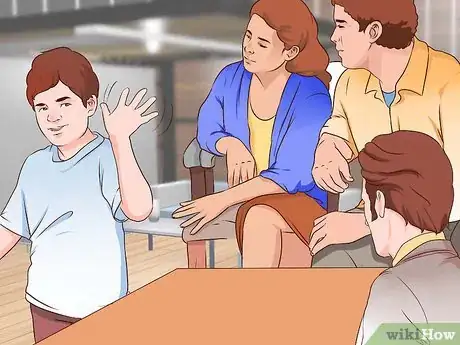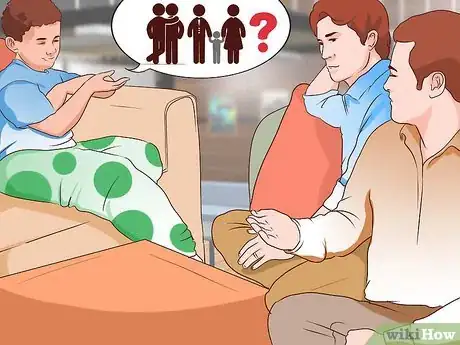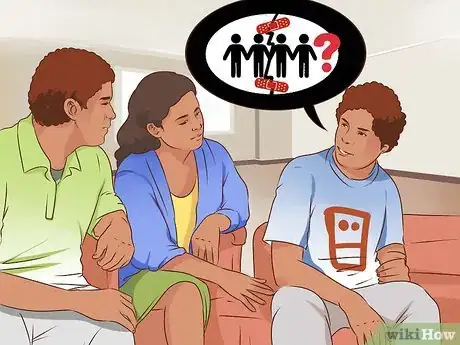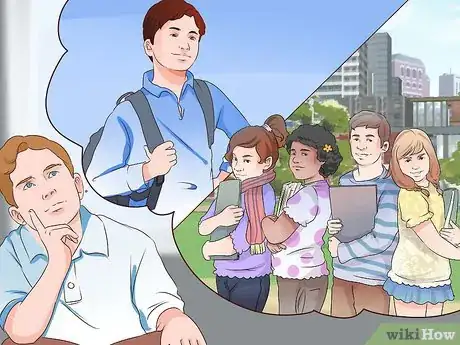This article was co-authored by Chandler Chang, PhD. Dr. Chandler Chang is a Licensed Clinical Psychologist, the Founder & Owner of Golden Hour Therapy and Therapy Lab, and a Clinical Instructor at the University of Southern California. With nearly 20 years of experience, she specializes in providing evidence-based, science-backed treatments to toddlers, children, teens, families, and adults to target specific mental health problems or cultivate mental wellness. Dr. Chang earned a BA from Princeton University and a PhD in Psychology from The University of Georgia. She completed UCLA's pre-doctoral internship and trained at NYU’s Child Study Center and UGA Regents Center for Learning Disorders.
This article has been viewed 22,890 times.
It might be hard to think of your parents as having a life beyond being your mom or dad, but their friends are an important part of your family life. Research has shown that parents who maintain strong friendships have children who also build healthy friendships.[1] While you might feel a little awkward around your parents' friends, you can easily interact with them and appreciate their friendships with your family.
Steps
Interacting With Your Parents' Friends
-
1Be hospitable. Whether it is an old friend who spends every weekend watching football with your dad or a new friend who works with your mom, you should try to make them feel welcome in your home. Ask them if they would like something to drink when they first arrive.
- Put away your phone or other electronics and make room for them on the sofa if you are sitting in the same room.
- If you are using the TV or listening to music when they come over, turn it off. The background noise can be distracting and make it appear like you don't really care about their presence.
- Help your parents clean and put away things before visitors come over.
-
2Engage in conversation with them. Even if you are generally shy and quiet, you should make a special effort for your parents' friends. These are people who care about you and may even view you as a second family. If your parent has friends who you find interesting, it’s a great opportunity to practice your social skills with somebody in a different age group who might have different life experiences.
- Ask them about something important in their life. Maybe they have a pet that they love or perhaps they have taken a trip recently. Show that you are interested in learning more about what is happening in their life.
- Your parents friends' will probably ask questions of you, too. Be sure to give them genuine answers. If they ask how school is going, don't just reply, "Fine." Mention a project you recently completed or a book you read for class that you enjoyed.
- Use polite language. Don't use profanity or other harsh language. You might think this makes you look mature, but it really is just off-putting.
- Make sure your conversation is appropriate. If your parents' friend has recently experienced something painful -- such as a divorce or a death in the family -- don't bring this up in casual conversation. It could surprise them or remind them of something very difficult.
Advertisement -
3Plan a time to leave. If your parents' friends are coming over to catch up, don't spend the entire time hanging around them. They may want to talk about some things more privately. Give them some distance and excuse yourself from the room.
- If your parents friends' have brought over their own kids, this would be a great opportunity to spend time with them. Invite them on a walk around the neighborhood or to hang out in your basement.
Learning from Your Parents' Friendships
-
1Model your behavior from your parents. How do your parents interact with their friends? What kinds of things do they do together? Do they have shared interests, hobbies and activities?
- Observe how your parents talk to their friends. How do they express interest in each other's lives? How do they joke or bond with each other?
-
2Ask about their history. Find out from your parents how they met their friends. How did they first form their friendships? How have they maintained their friendships over such a long history?
- Ask your parents what qualities they look for in friends, such as loyalty, a sense of humor, and emotional support. How do they build a friendship on these qualities?
-
3Get advice on conflict resolution. Every friendship will suffer some strain over time. The methods your parents use to overcome conflict in their friendships can help you maintain healthy friendships in your own life.[2]
- How do your parents manage disagreements with their friends? How do they find common ground with each other? How do they forgive each other when their friendships hit a rough patch?
Building Your Own Friendships
-
1Understand the benefits of friendships. Friendships can have enormous benefits for your emotional and physical health. They can give you a broader sense of purpose while also reducing stress and improving your self-esteem.[3]
-
2Forge common interests. As a child, you probably already have a built-in network of friends from school, church, and other community activities. But you can also find friends who share more specific interests with you, such as joining an athletic team, hosting a book club, or acting in a local community theater.
- If you are about to leave for college and make a new friend group, then look to join clubs and organizations that match your interests.
-
3Support each other. As a friend, you will act as a crucial support when times get tough for your friend. Whether your friend is dealing with financial stress, a breakup, or grieving the loss of a loved one, you have to show your support in times of need. Ask yourself how you can put your friend's needs before your own in these difficult times.
- You also need to be happy for your friend when they celebrate major successes or milestones in life, like a new job or a wedding. Don't be competitive or jealous with your friend.






































































